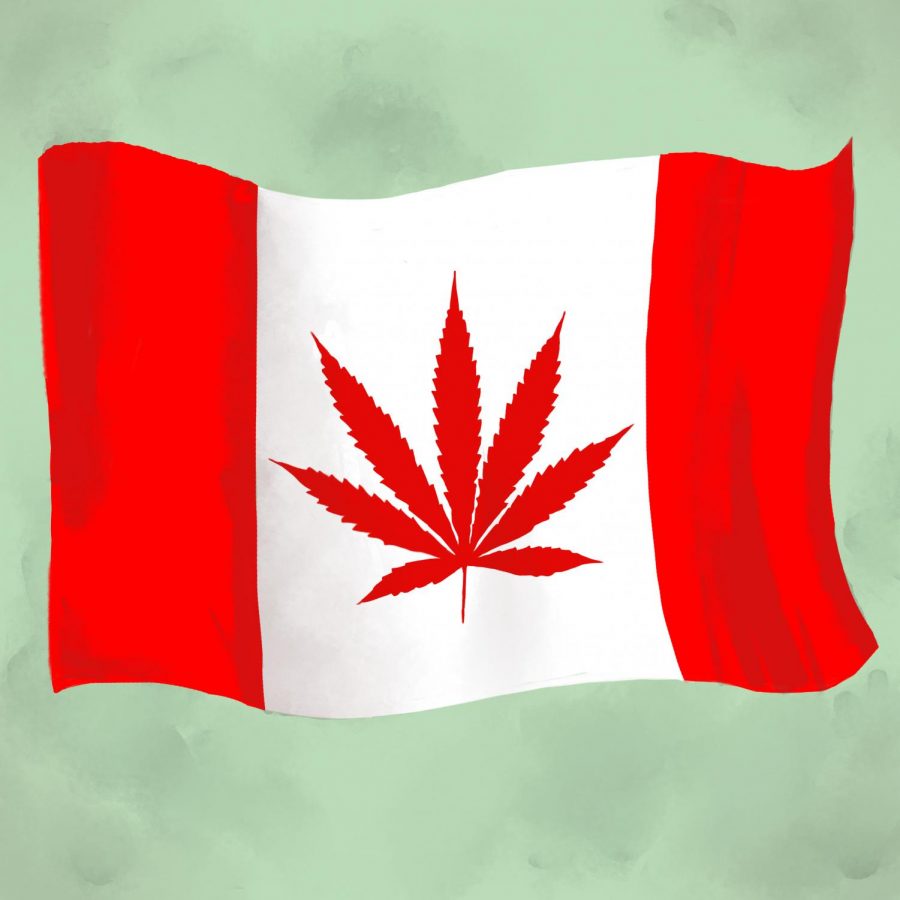Canada: The Second Country to Fully Legalize Cannabis
CANNABIS NOW LEGAL Will Canada’s full legalization of cannabis prove fruitful for the economy and the country, or will this cause the country to lose all respect from its peers?
November 9, 2018
On October 17 2018, Canada announced the passing of legislation for the legalization of cannabis in all of its territories. Prime Minister Justin Trudeau has voiced his full support for this law’s passing. Trudeau and the Canadian government believe that the full legalization of cannabis in all of Canada’s territories will decrease the size of the black market and the amount of sellers throughout the country. Drug dealers are attempting to bring down their prices to attract more buyers, but for many it seems the risk of unregulated cannabis is much greater than the possibility of getting cheaper deals.
In the world, one other country has fully legalized cannabis: Uruguay, a small country in South America with a population of 3.5 million, compared to Canada’s population of 36.7 million. The impact of Canada’s legalization of cannabis may be worldwide. Junior Kas Bakker said, “The impact from Canada will be far greater than that of Uruguay, as Canada’s population and status in the world are larger and higher than Uruguay.” In many other countries, there are smaller territories or states that have legalized cannabis on a local level, including the United States, where eight states and the capitol, District of Columbia, have legalized the drug.
In the United States, the states that went through the process of passing legislation to legalize cannabis have experienced positive outcomes from the decision, and Canada was often in contact with these state-level governments to discuss the positives and negatives of their overall decision. A commonly thought of hypothesis for Canada’s decision and its effects on the United States is that the United States “won’t change its mind on a federal level, but some states may change their individual opinions on it,” says senior Kaden Rizvi. Ultimately, as can be seen, Canada decided the rewards of legalizing cannabis far outweighed the risks.
Medical marijuana had been legal in Canada since 2001, but the full legalization of cannabis is a big change for the country. Sophomore Victoria Cannon said, “they were attempting to bring the amount of illegal possession charges and black market deals down to a minimum, to allow cops to focus on other major issues.” One of the goals of the Canadian government was to lower the amount of illegal possession charges in their territories, as well as providing a guaranteed safety of the product their citizens are buying. The black market sellers are attempting to lower their prices, however, according to an article by the New York Times. “Illegal drug dealers across the country have already responded by lowering their prices. Some in Montreal, for example, are offering two joints for the price of one.” Although these illegal dealers are attempting to drop their prices, not as many people are actually buying their product, and instead are looking to the government and medical marijuana dispensaries.
In a Wall Street Journal article, author Paul Vieria stated, “Before [October 17th], legalization had already started to reshape Canada’s financial markets. There are more than 120 marijuana companies listed on Canadian stock exchanges, but the market is overshadowed by five companies whose total stock market value has ballooned from less than $4 billion to more than $40 billion in the past year.” According to BNN Bloomberg, one such company, Tilray Inc., is selling their shares for just over $100 as of October 29th, 2018. Economic experts are predicting that Canada’s cannabis market should triple in the next five years, to become a booming industry and a major boost to Canada’s economy.
In an NPR interview with Canada’s Deputy Prime Minister, Anne McLellan, interviewer and author Emily Sullivan writes, “McLellan added that early tax revenues from generated cannabis sales will be used to research addiction treatment, for mental health resources and treatment, and for public education about the drug.” From their communications with the United States, and their previous ideas and health plans, Canada came up with a plan on how best to legalize and enforce their new cannabis laws. Prime Minister Trudeau even tweeted, “It’s been too easy for our kids to get marijuana – and for criminals to reap the profits. Today, we change that. Our plan to legalize & regulate marijuana just passed the Senate. #PromiseKept.” He followed through with his promise to lower crime by legalizing cannabis, and he wanted to remind Canadians that he helped to make it happen.
When asked about the possible impacts on other countries legalizing cannabis, freshman Maria Bolgar said that “other countries may not like it because they haven’t legalized it yet,” and yet “it will keep Prime Minister Trudeau’s public opinion the same, because some will love him and some will dislike him.” As Bolgar says, Trudeau’s government got very mixed responses from their population. Many believe that fully legalizing cannabis brings their country to the forefront for its progressive nature once again, as they have showed their progressive ideas in legalizing gay marriage, the rise of feminism, and abortion rights. Others say that it will hurt the country more than help it, as the country has already lost support internationally for some of their progressive movements.
After all of their discussions and voting, Canada’s reasoning and decision to legalize cannabis will have significant impacts on the country.



